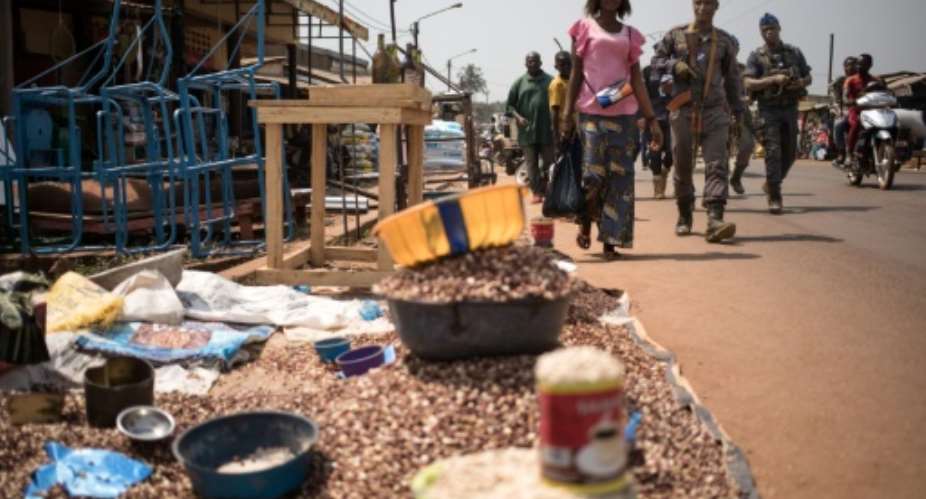Police have resumed patrols in a flashpoint district of the Central African Republic's capital, 20 months after being forced out by militia groups, an AFP reporter said Tuesday.
The Domestic Security Forces (FSI) -- the CAR police and gendarmerie -- were patrolling the main streets of the PK5 district, accompanied by UN peacekeeping troops.
The PK5 is a notorious trigger for violence in the CAR, one of Africa's poorest and most troubled countries.
The district became a theatre for clashes after the country's then-president, Francois Bozize was toppled in a coup in 2013.
Many Muslim traders took refuge there as sectarian conflict loomed between mainly Christian or predominantly Muslim armed groups.
Militias then moved into PK5, claiming to act as self-defence groups but forcing traders to pay "taxes."
In April 2018, an operation to pacify PK5 failed disastrously and the security forces were completely forced out of the district.
Tensions in the district came to a head last month when traders, outraged by the racketeering, took up arms against the militiamen and ousted them. More than 30 people died.
"I lost 2.5 million (CFA) francs ($4,300 / 3,800 euros) last month, so I am very happy to see the FSI here," Abdel Akim, a traders' representative who said he had been badly hit by the recent violence.
 Map locating the PK5 district in Bangui. By Sophie RAMIS (AFP)
Map locating the PK5 district in Bangui. By Sophie RAMIS (AFP)
The patrols began last week, "but it's not enough -- we need more patrols if we want peace to return," he said.
The fighting between the pro-Christian and Muslim militia in 2013 prompted the intervention of former colonial power France under a UN mandate.
Bozize's successor, Faustin-Archange Touadera, was elected in 2016 and governs with the support of MINUSCA, a 14,700-person UN peacekeeping force.
But most of the country lies in the hands of armed groups, who often fight over the country's mineral resources.
The long conflict has forced nearly a quarter of the country's 4.7 million people to flee their homes.
The United Nations estimates that two thirds of the population depends on humanitarian aid to survive.
The country is ranked next-to-last after Niger on the 2018 UNDP's Human Development Index, which compares longevity, education, and income per capita. Life expectancy is just 52.9 years.
There have been repeated peace agreements between the government and armed groups. The most recent, signed on February 6 last year, has lessened the intensity of the violence but not ended it.





 Meta releases new version of conversational AI across its platforms
Meta releases new version of conversational AI across its platforms
 Cape Town named Africa’s Best Airport 2024 by Skytrax
Cape Town named Africa’s Best Airport 2024 by Skytrax
 Bono East: Four injured after hearse transporting corpse crashes into a truck
Bono East: Four injured after hearse transporting corpse crashes into a truck
 ‘Be courageous, find your voice to defend our democracy’ — Sam Jonah urges journ...
‘Be courageous, find your voice to defend our democracy’ — Sam Jonah urges journ...
 Exodus of doctors, nurses and teachers have worsened because of unserious Akufo-...
Exodus of doctors, nurses and teachers have worsened because of unserious Akufo-...
 2024 election: Avoid insults, cutting down people in search of power – National ...
2024 election: Avoid insults, cutting down people in search of power – National ...
 ‘You passed through the back door but congratulations’ — Atubiga on Prof Jane Na...
‘You passed through the back door but congratulations’ — Atubiga on Prof Jane Na...
 Government’s $21.1 billion added to the stock of public debt has been spent judi...
Government’s $21.1 billion added to the stock of public debt has been spent judi...
 Akufo-Addo will soon relocate Mahama’s Ridge Hospital to Kumasi for recommission...
Akufo-Addo will soon relocate Mahama’s Ridge Hospital to Kumasi for recommission...
 We must not compromise on our defence of national interest; this is the time to ...
We must not compromise on our defence of national interest; this is the time to ...
